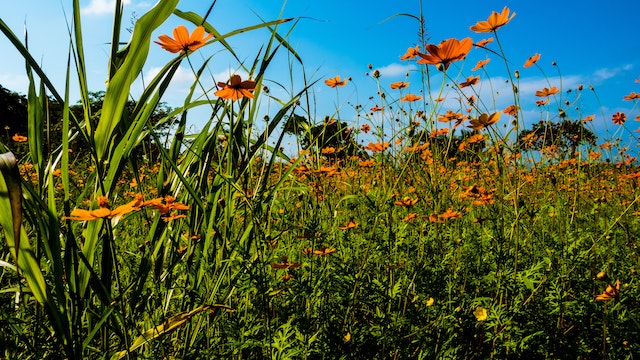Books are extremely valuable for native plant education. Books get you away from a screen and allow you to dive in a bit deeper, with fewer distractions, and really connect with the subject matter.
You will often find new information based on academic research or personal studies.
Books provide detailed and extensive knowledge about native plants, including their characteristics, growth habits, ecological importance, and cultivation requirements.
They explore the historical and cultural significance of native plants, sharing indigenous knowledge, traditional uses, and their role in folklore, medicine, and habitat restoration.
The following is a list of books and websites I’ve found valuable in my studies of native plants and wildlife ecology.
They cater to various levels of expertise and allow for self-guided exploration of many native plant topics.
Books About Native Plants & Responsible Gardening:
Bringing Nature Home, by Douglas W. Tallamy
A compelling book that highlights the importance of native plants in supporting local ecosystems, emphasizing their crucial role in sustaining biodiversity, restoring habitat, and fostering healthier relationships between humans and nature.
Tallamy’s work inspires readers to transform their landscapes into havens for native species, offering practical guidance on creating wildlife-friendly gardens and making a positive impact on the environment.
Nature’s Best Hope: A New Approach to Conservation that Starts in Your Yard, by Douglas W. Tallamy
A visionary and actionable guide that empowers individuals to become champions of conservation by cultivating biodiverse and sustainable landscapes in their own yards.
Tallamy takes his ideas a step further with compelling insights and practical strategies, Tallamy explores the critical role of native plants in supporting wildlife, restoring ecosystems, and combatting the environmental challenges of our time, inspiring readers to be catalysts for positive change in their communities and beyond.
Native Plants of the Southeast: A Comprehensive Guide to the Best 460 Species for the Garden, by Larry Mellichamp Will Stuart
An invaluable resource for gardeners, landscape enthusiasts, and nature lovers seeking to incorporate native plants into their Southeastern gardens.
With meticulous attention to detail, the book highlights 460 of the region’s most exceptional native plant species, providing comprehensive information on their characteristics, growing requirements, and ecological significance.
Accompanied by beautiful illustrations and practical tips, this guide equips readers with the knowledge and inspiration to create sustainable and vibrant landscapes that celebrate the unique beauty and ecological importance of Southeastern native plants.
Gardening With The Native Plants Of Tennessee: The Spirit Of Place, by Margie Hunter
A captivating guidebook that celebrates the rich botanical heritage of Tennessee and empowers gardeners to create enchanting landscapes using native plants.
Drawing on her deep knowledge and passion for the state’s flora, Hunter explores the diverse ecosystems and plant communities of Tennessee, highlighting the unique spirit of each region.
Through insightful tips, personal anecdotes, and practical advice, this book inspires readers to cultivate sustainable gardens that harmonize with the natural environment, promoting biodiversity and preserving the essence of Tennessee’s native plants.
Websites About Native Plants & Habitat Conservation
Lady Bird Johnson Wildflower Center (www.wildflower.org): The official website of the Lady Bird Johnson Wildflower Center provides a wealth of resources on native plants, conservation, and habitat gardening, including plant databases, gardening guides, and educational materials.
National Wildlife Federation (www.nwf.org): The National Wildlife Federation’s website offers a dedicated section on gardening for wildlife, emphasizing the use of native plants to create habitats that support biodiversity and attract wildlife species. It provides tips, plant lists, and helpful information for creating wildlife-friendly gardens.
Audubon Native Plants Database (www.audubon.org/native-plants): Audubon’s Native Plants Database is a comprehensive resource for identifying and selecting native plants suitable for specific regions. It promotes the use of native plants to create bird-friendly habitats and provides information on planting, care, and their ecological benefits.
Xerces Society for Invertebrate Conservation (www.xerces.org): The Xerces Society focuses on the conservation of invertebrates and promotes pollinator-friendly habitat gardening. Their website offers resources and guidance on incorporating native plants, creating pollinator gardens, and supporting beneficial insects in your garden.
Native Plant Society of the United States (www.npca.org/nativeplants): The Native Plant Society of the United States advocates for the protection and restoration of native plants and their habitats. Their website provides information on native plants, restoration projects, and how individuals can contribute to conservation efforts.
PlantNative (www.plantnative.org): PlantNative is a nonprofit organization dedicated to promoting the use of native plants for ecological restoration and sustainable landscaping. Their website offers a variety of resources, including plant databases, articles, and directories of native plant nurseries and suppliers.
North American Native Plant Society (www.nanps.org): The North American Native Plant Society is a valuable resource for native plant enthusiasts. Their website features information on native plant gardening, conservation, and upcoming events, as well as a forum for connecting with fellow native plant enthusiasts.
Pollinator Partnership (www.pollinator.org): The Pollinator Partnership focuses on promoting pollinator conservation and habitat restoration. Their website provides resources on native plants for pollinators, gardening guides, and information on creating pollinator-friendly landscapes.
These websites offer a wealth of information, resources, and inspiration for promoting native plants and habitat gardening.
They provide guidance on plant selection, garden design, and the ecological benefits of incorporating native species, empowering individuals to contribute to the conservation and preservation of our natural ecosystems.
This list of books and websites is not comprehensive, but at least a starting point. If you have recommendations of books, websites, or other resources you find valuable, please share them in the comments below.
The links on this page will be regularly updated so make sure and bookmark it to use as a resource.

